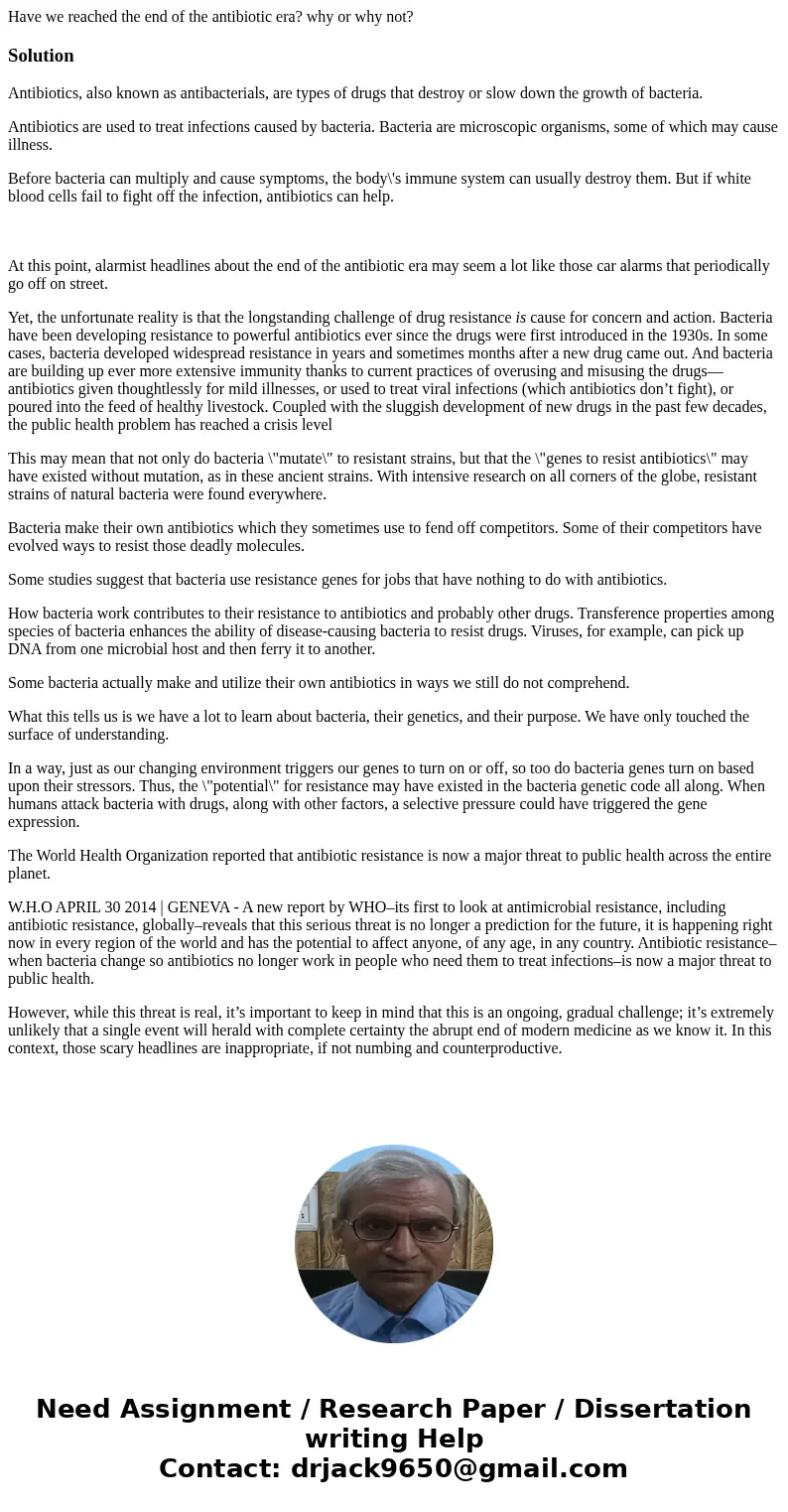Have we reached the end of the antibiotic era why or why not
Have we reached the end of the antibiotic era? why or why not?
Solution
Antibiotics, also known as antibacterials, are types of drugs that destroy or slow down the growth of bacteria.
Antibiotics are used to treat infections caused by bacteria. Bacteria are microscopic organisms, some of which may cause illness.
Before bacteria can multiply and cause symptoms, the body\'s immune system can usually destroy them. But if white blood cells fail to fight off the infection, antibiotics can help.
At this point, alarmist headlines about the end of the antibiotic era may seem a lot like those car alarms that periodically go off on street.
Yet, the unfortunate reality is that the longstanding challenge of drug resistance is cause for concern and action. Bacteria have been developing resistance to powerful antibiotics ever since the drugs were first introduced in the 1930s. In some cases, bacteria developed widespread resistance in years and sometimes months after a new drug came out. And bacteria are building up ever more extensive immunity thanks to current practices of overusing and misusing the drugs—antibiotics given thoughtlessly for mild illnesses, or used to treat viral infections (which antibiotics don’t fight), or poured into the feed of healthy livestock. Coupled with the sluggish development of new drugs in the past few decades, the public health problem has reached a crisis level
This may mean that not only do bacteria \"mutate\" to resistant strains, but that the \"genes to resist antibiotics\" may have existed without mutation, as in these ancient strains. With intensive research on all corners of the globe, resistant strains of natural bacteria were found everywhere.
Bacteria make their own antibiotics which they sometimes use to fend off competitors. Some of their competitors have evolved ways to resist those deadly molecules.
Some studies suggest that bacteria use resistance genes for jobs that have nothing to do with antibiotics.
How bacteria work contributes to their resistance to antibiotics and probably other drugs. Transference properties among species of bacteria enhances the ability of disease-causing bacteria to resist drugs. Viruses, for example, can pick up DNA from one microbial host and then ferry it to another.
Some bacteria actually make and utilize their own antibiotics in ways we still do not comprehend.
What this tells us is we have a lot to learn about bacteria, their genetics, and their purpose. We have only touched the surface of understanding.
In a way, just as our changing environment triggers our genes to turn on or off, so too do bacteria genes turn on based upon their stressors. Thus, the \"potential\" for resistance may have existed in the bacteria genetic code all along. When humans attack bacteria with drugs, along with other factors, a selective pressure could have triggered the gene expression.
The World Health Organization reported that antibiotic resistance is now a major threat to public health across the entire planet.
W.H.O APRIL 30 2014 | GENEVA - A new report by WHO–its first to look at antimicrobial resistance, including antibiotic resistance, globally–reveals that this serious threat is no longer a prediction for the future, it is happening right now in every region of the world and has the potential to affect anyone, of any age, in any country. Antibiotic resistance–when bacteria change so antibiotics no longer work in people who need them to treat infections–is now a major threat to public health.
However, while this threat is real, it’s important to keep in mind that this is an ongoing, gradual challenge; it’s extremely unlikely that a single event will herald with complete certainty the abrupt end of modern medicine as we know it. In this context, those scary headlines are inappropriate, if not numbing and counterproductive.

 Homework Sourse
Homework Sourse